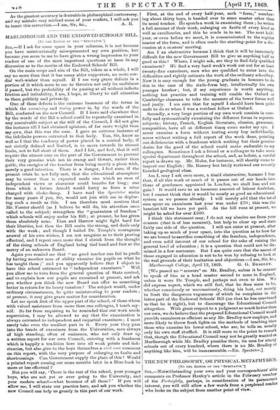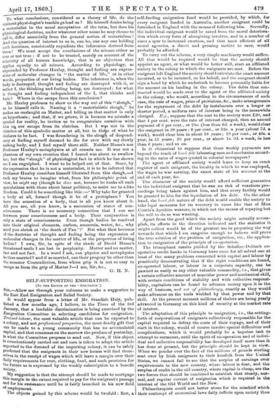THE NEW PHILOSOPHY, OR PHYSICAL METAPHYSICS.
[TO TEE EDITOR OF THE .4 srseraroa."1
Stn,—Notwithstanding your own and your correspondents' able comments on Professor Huxley's article in the February number of the Fortnightly, perhaps, in consideration of its paramount interest, you will still allow a few words from a perplexed reader who looks on the subject from another point of view. To what conclusions, considered as a theory of life, do the eminent physiologist's teachings lead us ? He himself denies being a materialist in the usual acceptation of the term, but does his physiological doctrine, under whatever other name he may choose to call it, differ essentially from the general notion of materialism? And the question of interest to us is, can he, can any one holding such doctrines, consistently repudiate the inferences derived from them? We must accept the conclusions of the science either as true or not true ; if not to be trusted, merely on account of the relativity of all human knowledge, that is an objection that applies equally to all science. According to physiology, as expounded by Professor Huxley, thought and feeling are expressions of molecular changes in " the matter of life," or in other words, properties of our living bodies. The inference is, when the body is destroyed, thought and feeling are destroyed with it, or rather I, the thinking and feeling being, am destroyed : for what is thought and feeling independent of the I, that thinks and feels? Where is the escape from this conclusion?
Mr. Huxley professes to show us the way out of this " slough," as he himself calls it. Naming it a " materialistic slough," be makes an onslaught on Matter, and telling us that matter is only an hypothesis; and that, if we grieve, it is because we mistake a symbol for reality, he invites us to congratulate ourselves with him ola our escape from its clutches. But I was not in the clutches of this symbolic matter at all, but in th6je of what he declares to be fact. I was floundering in the slougia of despondency at finding myself doomed to die for ever with my slowly sinking body, and I find myself there still. Neither Hume's nor Professor Huxley's metaphysics at all console me. It was not a phantom of my own creation that I feared was about to swallow me; but the "slough" of physiological fact in which he has shown me I am engulphed. I want to be helped out of that. Since, by the expression that he is not a materialist, it is to be inferred that Professor Huxley considers himself liberated from this slough,—I rack my brains to imagine what, from his philosophic point of view, he might say (though he does not, because he ranks all such speculations with those about lunar politics), to assist me to a like freedom. Could it be something like this Why take for granted a body at all, formed though it be of a protoplasm ? You have the sensation of a body, that is all you know about it. All you are, all you know, is a succession of states of consciousness. There is no necessary connection that I can see
• between your consciousness and a body. Their conjunction is only a state of consciousness. Even though bodies be resolved into their original elements, carbon, ammonia, water, &c., why need you shriek at ' the death of Pan' ?' But what then becomes of the doctrine of thought and feeling being the expression of molecular changes in the matter of life, or the properties of living bodies? I own, Sir, in spite of the shade of David Hume's, threatened smile I am lost in perplexity. Matter and no matter, fact and not fact. In a word I ask, can physics and metaphysics be thus married? and if so married, can their progeny be other than the monster Contradiction, from whose grip it is not so easy to escape as from the grip of Matter Y—I am, Sir, &c., G. IL N.



































 Previous page
Previous page